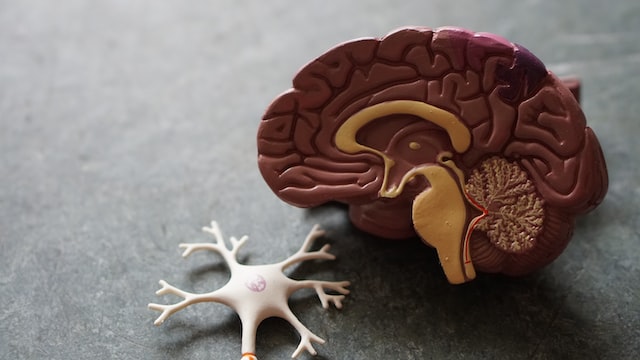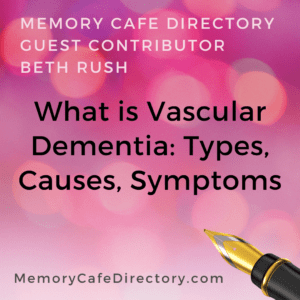Memory Cafe Directory posts and/or links to retailers can be advertising, sponsored, or affiliate links. We may earn a small commission from them. Thank you.
Caregivers of loved ones with dementia should be educated on all aspects of the disease. There are some significant differences between each type, so knowing how to care for someone with vascular dementia specifically will help you a lot.
Here is the explanation of vascular dementia vs. dementia in general.
What Is Dementia?
Dementia is an umbrella term to generalize memory, language, and problem-solving struggles that interfere with everyday life. These issues are challenging for the person affected and the caregiver, so patience and understanding go a long way.
Dementia is not a single disease. It is a general term. The types of dementia include:
- Alzheimer’s disease
- Vascular
- Lewy body
- Frontotemporal
- Others, including Huntington’s
- Mixed dementia
Damage to the brain interferes with the ability of brain cells to communicate normally. When this is affected, thinking, behavior, and feelings are not expressed at their best ability. Each region of the brain is responsible for functions like memory, movement and judgment. When they are damaged, they cannot carry out their normal operations.
What Is Vascular Dementia?
Vascular dementia is the decline of thinking skills caused by conditions that reduce or block blood flow to many brain regions, causing a lack of nutrients and oxygen. Inadequate blood flow can damage or kill cells throughout the body. The brain is particularly vulnerable because of this.
It is essential to understand that vascular dementia changes thinking skills since there is a block in major blood vessels in the brain. It may be mild at first and gradually worsen due to strokes or other conditions affecting smaller blood vessels leading to more widespread damage.
Many experts use the term “vascular cognitive impairment” since it emphasizes that vascular thinking ranges from mild to severe.
Other dementias share common symptoms. Only 5%-10% of people with dementia have vascular dementia by itself. It is typically seen in mixed dementia. Although it is recognized as common, along with Alzheimer’s, many believe it is under-diagnosed.
Types of Vascular Dementia
There are four different types of vascular dementia. Although some are more common than others, you should still be aware of them.
Subcortical Vascular Dementia
This type is supposed to be the most common of vascular dementias. It is caused by tiny blood vessels in the brain that, over time, develop thick walls and become twisted and stiff, interfering with blood flow. The brain areas with these blood vessels lack oxygen and nutrients and eventually stop working, causing brain cell loss.
Most of the damage happens in the subcortex, which is vital for connecting different brain parts to process information. It can also affect expressing, controlling emotions, movement, clumsiness and problems pronouncing words.
Stroke-Related Dementia
A stroke can cause vascular dementia since the blood supply to the brain is suddenly cut off. A blood vessel in the brain becomes narrowed and blocked by a clot. Some strokes are more severe depending on where the vessel is blocked and how long the supply is interrupted.
Someone who has a stroke is at a greater risk of having another one. The more strokes someone has, the more likely they will develop dementia. Symptoms can differ depending on the area that has been damaged. Some people experience difficulty with language and emotions or physical issues like speech problems or trouble swallowing.
Multi-Infarct Dementia
This is caused by multiple smaller strokes, including transient ischaemic attacks (TIA). They are similar to strokes, but symptoms don’t last as long and improve by themselves. It can be challenging to notice they happened. A blocked vessel can be cleared after a few minutes by itself or with treatment, so symptoms of the stroke may be temporary.
Someone who has multiple small strokes may develop dementia. The damage can add up over time, causing memory, thinking and reasoning issues.
Mixed Dementia
One or more conditions can cause dementia. Many people who are diagnosed have more than one type. Most of the time, Alzheimer’s is mixed with vascular dementia.

Photo by Robina Weermeijer on Unsplash
Vascular Dementia Symptoms
Vascular dementia symptoms can differ depending on the area of the brain impacted. Caregivers should be aware that symptoms can overlap with Alzheimer’s, but the most notable signs of vascular dementia involve the pace of problem-solving and thinking over memory loss.
Here are symptoms and signs to look out for:
- Confusion
- Trouble concentrating
- Difficulty organizing thoughts or actions
- Reduced ability to analyze a situation
- Slow thinking
- Problems organizing
- Difficulty making decisions
- Memory issues
- Restlessness and agitation
- Frequent urge to urinate
- Depression

Photo by Tim Doerfler on Unsplash
The symptoms are the clearest after sudden strokes or mini-strokes. Changes in thought processes are more noticeable and will not feel like the gradual decline that typically happens in patients with Alzheimer’s.
Causes of Vascular Dementia
Vascular dementia is a result of damage to the brain’s blood vessels. It reduces the ability to supply oxygen and nutrients to the brain. Common conditions that can lead to this are:
Stroke Blocking a Brain Artery
This can cause a range of symptoms or even go unnoticed. Silent and apparent strokes could lead to vascular dementia. Multi-infarct dementia develops after multiple mini-strokes.
Brain Hemorrhage
High blood pressure weakens blood vessels leading to bleeding in the brain, causing a buildup of protein over time.
Narrowed or Damaged Brain Blood Vessels
High blood pressure, abnormal aging of blood vessels, and wear and tear from getting older can inflict long-term damage and lead to vascular dementia.
Vascular Dementia Risk Factors
Many risk factors increase a person’s chance of developing vascular dementia. Some can be avoided, while others cannot.
Aging
Your risk rises as you grow older. The disorder is rare before 65.
Sleep Apnea
This is a condition where a person stops breathing for a few seconds or minutes when sleeping. It can cause blood clots to form in the brain.
Cardiovascular Conditions
People with heart and blood circulation issues have a higher risk.
Cerebral Amyloid Angiopathy (CAA)
This vascular disease damages small arteries in the outer region of the brain.
Diabetes
Blood vessels are damaged by high glucose levels.
Smoking
Smoking directly damages your blood vessels and increases circulatory diseases.
Obesity
Being overweight is a well-known risk factor for any vascular disease.
Alcohol
Heavy drinking can increase cholesterol, blood pressure and weight.
Vascular Dementia Prevention Measures
Taking steps to reduce the risk of vascular dementia includes finding ways to keep the brain’s blood vessels and heart healthy.
Quit Smoking
Tobacco damages all blood vessels in the body.
Control Diabetes
Take steps to control your glucose levels if you have diabetes.
Maintain Healthy Blood Pressure
Keeping blood pressure at a normal range may help prevent vascular dementia and Alzheimer’s.
Get Exercise
Regular activity should be a priority in a wellness plan.
Keep Track of Cholesterol
Following a healthy diet and taking medications will reduce the risk of strokes and heart attacks that could lead to vascular dementia.
Managing Vascular Dementia Symptoms
Various activities and therapies can help manage vascular dementia. Caregivers must ensure the physical and emotional well-being of their patients.
Some options could include the following:
Cognitive Stimulation Therapy (CST)
This keeps people’s minds active by doing themed activity sessions over several weeks.
Life Story Work
People with dementia engage in the activity of recording memories and life experiences.
Occupational Therapy (OT)
The Occupational Therapist provides advice and support on living with vascular dementia at home.
Guided Reminiscence
Patients talk about things from the past and revisit music or photos.
Creative Arts Therapies
People can be creative by playing music or painting during therapeutic sessions.
Understanding Vascular Dementia
Caregivers can find it challenging to help loved ones with vascular dementia. Knowing the ins and out of this form of dementia will help with navigating the symptoms or figuring out if they are at risk.
About the Author
Beth Rush

Beth Rush
Beth Rush is the Managing Editor and Content Manager at Body+Mind.
Body+Mind features articles about diet, fitness, mental health, parenting and health care.
Become a Contributor!
 Do you want to be a Memory Cafe Directory contributor? If you have helpful information to share with our community, read about the guidelines, then get in touch to discuss what you have to offer.
Do you want to be a Memory Cafe Directory contributor? If you have helpful information to share with our community, read about the guidelines, then get in touch to discuss what you have to offer.
Thank you.





